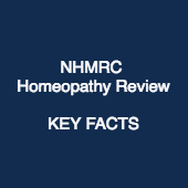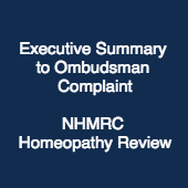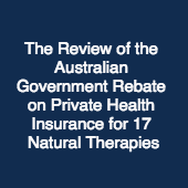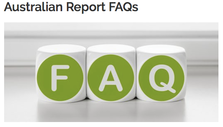|
This website provides information relating to evidence reviews of a number of natural therapies conducted by Australia's National Health & Medical Research Council (NHMRC) between 2012 and 2015. These reviews are being used by decision-makers and political parties to justify regulatory changes and consumer access to health fund rebates - impacting consumer right of choice and access to healthcare.
Members of the public, decision-makers, researchers and other stakeholders are invited to consider the information presented on this website, in determining whether the NHMRC conducted ethical, impartial, transparent and "rigorous" reviews of the evidence on homeopathy and other natural therapies, using "standardised, accepted methods" as claimed. NHMRC Complementary Medicine Reviews“Let me assure you I am no supporter of homeopathy. Between 2012 and 2015, Australia's National Health & Medical Research Council (NHMRC) conducted evidence reviews of a number of complementary/ natural therapies:
This includes popular, widely used modalities such as naturopathy, herbal medicine, yoga, pilates, tai chi, massage (all forms), homeopathy, aromatherapy, Ayurvedic medicine, kinesiology, Feldenkrais, Alexander Technique, aromatherapy, Buteyko breathing, reflexology, Bowen therapy, amongst others. The NHMRC reviews concluded there was no 'reliable' or 'clear' evidence that any of the 17 natural therapies assessed were effective - contrary to the experience of the millions of Australians that have effectively use these therapies for decades and inconsistent with the growing body of good quality, positive research underpinning these therapies. In these reviews, NO original research papers were retrieved or assessed. NHMRC's obligation to the Australian public: The NHMRC is Australia's premier public institution responsible for informing the community on matters relating to health. Its mission is, "Working to build a healthy Australia". The NHMRC, as a tax-payer funded institution, has a duty to the public to ethically, impartially and accurately inform it of evidence to support their healthcare choices. Around 70% of Australians use some form of complementary medicine service and/or product each year to complement their healthcare needs [1,2], finding them to be safe, effective and value for money. For many, complementary medicine therapies and products play a primary role in maintaining good health. Between 2005 and 2015, the NHMRC spent only $2.3 million (0.03%) on complementary medicine research and over $6.7 billion on research into conventional medicine [3] - despite 2 in 3 Australians using complementary medicine services and products. The NHMRC complementary medicines webpage states that since 2007, it has spent $67 million on research into 'complementary medicine and alternative therapies' - without clarifying that this includes money spent on its contentious 2015 reviews of 16 natural therapies (i.e. not original research) and 'alternative' medical interventions that are unrelated to complementary medicine - the latter accounting for the majority of the $67 million figure (which itself is considerably less than 1% of NHMRC's research budget since 2007) [3]. The NHMRC Research funding statistics and data webpage does not include complementary medicine research as a funding category. Did NHMRC do what it said it did? In reviewing the evidence of a range of complementary medicines, NHMRC assured the Australian public that it assessed the evidence using "a rigorous approach that has been developed by Australian experts in research methods" and assured the public that its conclusion:
The information provided on this site allows people to decide for themselves whether Australia's NHMRC ethically, impartially and transparently assessed the evidence using 'accepted, standardised methods for reviewing health evidence' as claimed. Investigation of NHMRC's procedures & methods: A formal investigation into NHMRC's procedures and methods in conducting its assessment of the evidence on homeopathy has revealed that NHMRC:
NHMRC Homeopathy Review information reel:A more detailed expose of NHMRC's conduct of the Homeopathy Review is provided in the following articles:
These issues are of great significance to the community, as they impact:
Formal investigation - Ombudsman Complaint: A formal investigation into NHMRC's conduct of the Homeopathy Review reveals that NHMRC has misled the public about the research evidence on homeopathy and has also withheld critical information relating to its methods and procedures. The findings are fully detailed in a multi-stakeholder Submission of Complaint lodged with the Australian Commonwealth Ombudsman, detailing bias, conflicts of interest, procedural irregularities, methodological flaws and inaccurate reporting. The Complaint has been brought by Complementary Medicines Australia (CMA), the Australian Homoeopathic Association (AHA) and the Australian Traditional Medicine Society (ATMS), with scientific support from the Homeopathy Research Institute (HRI). Below is a link to the Executive Summary of the Complaint to the Commonwealth Ombudsman regarding the NHMRC assessment of homeopathy, 2010-2015: Why does it matter?
NHMRC is a publically funded Government agency that describes itself as 'an established leader in the development of high quality, evidence-based health advice' – the general public, health practitioners, decision-makers and other researchers all rely on its findings. The potential impact of an evidence review by a respected institution such as NHMRC is significant and it is therefore essential that its processes are free from bias, providing a fair and objective assessment. NHMRC operates within a legal framework that requires the highest ethical standards of scientific (NHMRC Act 1992) and administrative conduct (Public Service Act 1999) to be upheld. The Australian Public Service (APS) Values requires that all APS agencies, such as the NHMRC, demonstrate a high level of ethical, impartial, respectful, transparent and collaborative conduct - to maintain public trust in the ability of APS agencies to serve their needs. A pillar of NHMRC's Strategic Direction is that it will: "maintain a strong integrity framework for research and guideline development, underpinning rigorous research and relevant and accurate guidelines and promoting community trust." “The dismissal of positive systematic reviews compounded with the lack of an independent systematic review of high quality randomised controlled trials leaves me uncertain of the definitive nature of the Report’s conclusions." |
"... when a substantial proportion of small (but good quality) studies show significant differences, […] 'no reliable evidence' does not seem an accurate reflection of the body of evidence." “There is sufficient evidence for the preclinical effectiveness and the clinical efficacy of homeopathy and for its safety and economy compared with conventional treatment.” |
[1] Xue CC, Zhang AL, Lin V, Da Costa C, Story DF. Complementary and alternative medicine use in Australia: a national population-based survey. J Altern Complement Med. 2007;13(6):643–50
[2] Complementary Medicines Australia. Australia’s complementary medicines industry audit 2019. http://www.cmaustralia.org.au/resources/CMA-INDUSTRY_AUDIT-V4.pdf
[3] NHMRC research grant data 2005-2015 - historical data available on previous NHMRC website
[2] Complementary Medicines Australia. Australia’s complementary medicines industry audit 2019. http://www.cmaustralia.org.au/resources/CMA-INDUSTRY_AUDIT-V4.pdf
[3] NHMRC research grant data 2005-2015 - historical data available on previous NHMRC website






